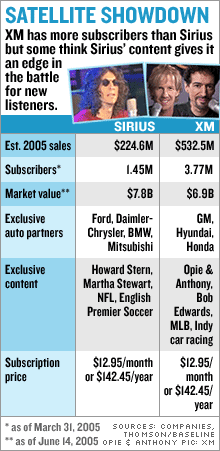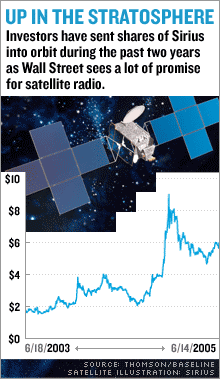 |
 |
|
|
|
|
| More about satellite radio
|
|
|
|
|
|
|
NEW YORK (CNN/Money) -
Sirius Satellite Radio claims on its Web site that not all radio is created equal.
Wall Street agrees. While shares of traditional radio operators like Clear Channel Communications (Research) and Citadel Broadcasting (Research) have floundered the past two years, the stocks of Sirius and its rival XM Satellite Radio have soared.
More listeners appear to be abandoning AM and FM stations for the diverse, and often commercial-free, satellite offerings of Sirius and XM.
And even though Sirius (Research) is smaller than XM (Research), in terms of both revenues and subscribers, it arguably has more buzz. The company hired former Viacom (Research) chief operating officer and radio veteran Mel Karmazin to be its CEO last November.
That came after it signed shock jock Howard Stern, radio's most famous personality. Stern's Sirius show is due to start next January.
But Sirius stock's been extremely volatile. Often among the most actively traded issues on Nasdaq, Sirius has surged as high as $9.43 over the last year and dipped as low as $2.01. Shares of the New York-based company are now about $6.
Sirius has posted losses every quarter since its inception and has far fewer subscribers than rival XM. But investors may have reason to be upbeat.
With more than $600 million in cash on hand, exclusive radio broadcasting rights to the 2005 National Football League season and the upcoming arrival of Stern, shares of Sirius could be a seriously good investment.
Tuning into profits
As of March 31, Sirius boasted more than 1.4 million subscribers, an increase of 21 percent since the end of 2004. Yet some investors are wary of Sirius because of its slow march to profitability.
Sirius lost $712.2 million, or 57 cents a share, in 2004. According to Thomson/First Call, analysts estimate Sirius will lose 59 cents a share this year and another 54 cents a share in 2006. Most analysts anticipate that Sirius will not make money until 2008.
Kit Spring, an analyst with Stifel Nicolaus & Co., said Sirius has been losing money due to the huge expenses needed to get this kind of business off the ground, so to speak.
"It's a very high fixed-cost business. You have satellite transportation costs, programming costs and customer service costs," said Spring.
There's also the money being doled out to its growing stable of celebrity on-air talent. In addition to Stern, who will be receiving $500 million over five years, Sirius recently signed a deal with domestic diva Martha Stewart to launch a channel on Sirius. Her company, Martha Stewart Living Omnimedia, agreed to a $7.5 million deal over four years.
The company also subsidizes some of automakers' equipment and installation costs to get more of its radios in new vehicles. That's led to heavy subscriber acquisition costs, or SAC, for Sirius. Last year the company spent $177, on average, to add a new subscriber, or almost $25 more than what that same subscriber would pay with a yearly subscription.
But as manufacturing costs fall, Sirius expects these costs to drop. This year, Sirius expects its SAC to fall to $145 per subscriber.
Taking on XM
In the narrow field of satellite radio, Sirius and XM carry out a strange coexistence. Both companies charge the same fee of $12.95 a month, or $142.45 for a full year's subscription. And each company has over 20,000 retailers pushing their receivers.
Analysts say there's plenty of room for both companies to grow and become profitable several years from now. But XM has a big lead on Sirius, with nearly 2.3 million more subscribers. And experts are unsure whether Sirius can catch XM in that race.
Sirius should see a pop in subscribers within the next few months since it has the exclusive rights to the 2005 NFL season, the unveiling of Martha Stewart's new channel in the fall and most importantly, the January arrival of Stern.
Maurice McKenzie, analyst with Friedman Billings Ramsey, said such programming will help trim the gap over the long term. "As we look out over a longer time horizon we expect Sirius to achieve parity with XM," said McKenzie.
But perhaps the most lucrative source of subscriber growth for both Sirius and XM are their exclusive agreements with automakers. Sirius recently announced deals with Ford and Chrysler to install its radios into over a million of their cars.
Still, April Horace, an analyst with Hoefer & Arnett, thinks XM has an advantage because it has a relationship with General Motors, the world's largest automaker.
"XM will have the lead for the foreseeable future since GM has very much embraced XM," she said.
Besides the support of GM, XM also has a commitment from Honda to include 400,000 radios in new cars while Hyundai plans to make the receiver standard in all of its cars by 2006, which could add another 400,000 subscribers.
Serious volatility
With approximately 1.3 billion shares outstanding, Sirius has been fairly volatile during its history. For example, the stock is down more than 20 percent this year after a more than 140 percent gain in 2004. McKenzie doesn't expect that trend to change any time soon.
"The stock has a large individual shareholder base which is more reactionary to headlines than stocks with a large institutional investor base, creating more volatility in its share price," said McKenzie.
That unpredictability could scare off some investors. And since Sirius has yet to post a profit, analysts agree that the number of subscribers is the magic number to watch, as opposed to sales, earnings, or more traditional financial measures. To that end, the company has said that it expects to have 2.7 million subscribers by year's end, a nearly 90 percent increase from the end of the first quarter.
But Sirius also has a healthy balance sheet, which means the company probably can withstand another few years of losses.
Steve Mather, an analyst with Sanders Morris Harris, said that even though Sirius is spending about $1 million a day, he's not concerned since the company had about $630 million on its balance sheet at the end of March and is on track to break even on a cash flow basis by 2007. "We don't anticipate a cash crunch," he said.
So with a big expansion in programming and growing hopes that Sirius will finally turn profitable in coming years, now might be a good time to lock into Sirius' signal.
Like the latest gadgets and gizmos? Click here.
Want to know who the market movers are? Click here.
Analysts quoted in this story do not own shares of Sirius and their firms have not performed investment banking for the company during the past 12 months.

|